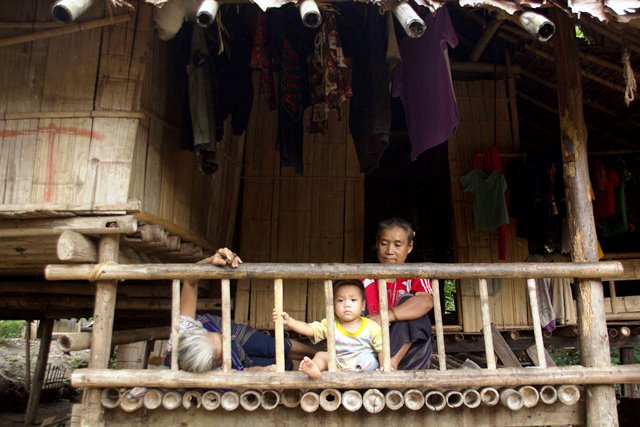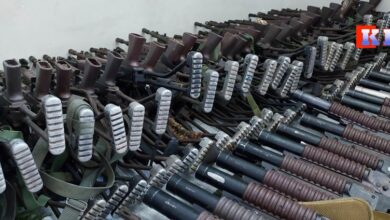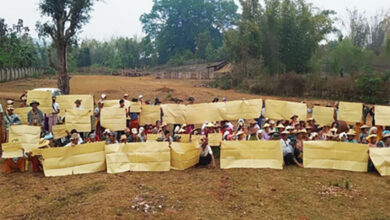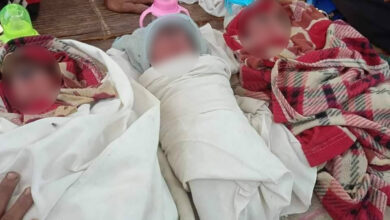Human Rights Watch, UNHCR and Refugees Raise Concerns Following Reports That Thai Military Will Return Refugees After Reaching Agreement with Burma’s Military

Thailand’s National Council for Peace and Order (NCPO), has reached an agreement with the commander-in-chief of Burma’s military to repatriate the 120,000 refugees on the Thai Burma border.
The agreement has alarmed human rights experts and has increased refugees concerns, with uncertainty as to exactly when and where the refugees will go and how their safety can be guaranteed.
Head of the NCPO, General Prayuth Chan-ocha, announced on Friday during his weekly television broadcast to the Thai nation that almost 120,000 refugees from nine camps would be sent back to Burma.
General Prayuth’s announcement followed a meeting with the commander-in-chief of the Burma Army, General Min Aung Hlaing.
General Prayuth was quoted in The Bangkok Post as saying that refugees would be returned safely in compliance with “humanitarian principles.”
Human rights experts have warned of a lack of transparency surrounding the plan to send refugees back to Burma, noting that General Prayuth’s statement left out the exact conditions for the refugee return.
The United Nations High Commission for Refugees said that the government should stand by its previous commitments.
“The Royal Thai Government has consistently reassured us that any refugee returns to Myanmar [also known as Burma] must be voluntary and conducted in safety and dignity. UNHCR is not aware of any changes in this [Thailand] government policy, or of a government timeframe to repatriate refugees,” a spokesperson from UNHCR said in an interview with Karen News.
The UNHCR confirmed, however, that it was aware of the Thai government performing head counts of refugees in some of the camps, but that the exact purpose of the headcounts was unclear. “UNHCR is seeking more information from the RTG on the head-counts and on any actions resulting from the head counts,” a UNHCR spokesperson said.
A Thai military source in The Bangkok Post seemed to contradict the UNHCR statement when quoted as saying that the military was receiving assistance from the UNHCR to divide refugees based on those who wanted to remain in Thailand, return to their homeland or resettle in a third country. The Bangkok Post source estimated that the process to send refugees would take one year.
The UNHCR described The Bangkok Post source as being ‘inaccurate.’
“The unnamed [military] source may have been referring to a refugee survey conducted by the Mae Fah Luang Foundation for UNHCR. This survey was not meant to ‘sort’ the refugees into groups as incorrectly reported. The aim of the exercise is to gather demographic and livelihood profiles of all the refugees in the nine camps… and to get a sense of how they see their future,” the spokesperson said.
The UNHCR spokesperson added that the reports in The Bangkok Post of the UNHCR offering to provide land and financial assistance to refugees were untrue.
“We have not yet discussed what assistance would be provided to refugees who choose to return to Myanmar eventually. For one, UNHCR is not in any position to provide land in Myanmar.”
The UNHCR spokesperson reiterated that conditions in Burma were not yet ready to repatriate refugees back to Burma.
“While UNHCR and other aid agencies have heightened levels of preparedness in light of positive developments in Myanmar in the last two years, we have consistently said that a number of conditions in south-eastern Myanmar where the refugees come from are not yet fully conducive to organized returns. This includes the absence of a permanent ceasefire, the presence of mine fields and lack of critical infrastructure in some areas.”
A spokesman from The Border Consortium, an NGO that administers aid to the camps, also said he was not aware of any significant changes in Thai policy.
Speaking to Karen News, Duncan McArthur, partnership director at TBC said, “TBC is not aware of any significant change in Thai policy relating to refugees under the National Council for Peace and Order, nor of any order relating to refugee registration or screening processes. We understand that no timeframe was mentioned in regards to refugee return during General Prayuth’s weekly broadcast on Friday night.”
Speaking in response to refugee concerns, Mr. McArthur said, “The respective local administrative authorities appear to be interpreting messages from the military about the necessity of population counts in different ways. A population count has already been conducted by in Umphiem Mai, but there has been no punitive response to date. Plans are underway for other camps in Tak province, but this does not appear a priority in other provinces.”
Mr McArthur stated in an email to Karen News that the current situation did not allow for the repatriation of refugees back to Burma.
“TBC’s assessment remains that the conditions are not yet conducive for a voluntary return in safety and nor sustainable reintegration with dignity.”
Meanwhile the UNHCR spokesman said that they had received no information from the Thai government that refugees would be de-registered.
“There has been no communication by the Royal Thai Government to UNHCR that refugees will be deregistered if they are not present for the head counts, even if there have indeed been mention by 2 camp authorities (Umpiem and Nupo) to refugees that those who are not present during headcounts will be de-registered.”
Mr Phil Robertson, Deputy Director of Human Rights Watch’s Asia Division said threats by Thai authorities to revoke the status of refugees for any reason was not the way forward.
“Any effort by the Thai authorities to cancel refugee status for violations of administrative procedures is a clear violation of refugee rights and totally contrary to international human rights law. The problem is that Thai security officials view refugees as a national security problem when in fact this is really a humanitarian issue that requires understand and support, not threats,” Mr. Robertson said in an interview with Karen News, “Rather than threatening refugees, the Thai military junta should recognize that cooperation with refugee communities is the only way forward to ensure a fair, safe and durable solution to the long-standing refugee situation along the Thai-Burma border.”
Mr. Robertson said that the Thai government was not meeting its human rights obligations in its policy to refugees.
“These latest threats compound the failure of the Thai government continues to meet its international human rights obligations by systematically obstructing new refugee registrations by deliberately refusing to operationalize the so-called Provincial Admission Boards (PABs) – leaving now more than 50% of the refugees in the camps in an unregistered status.”
Mr. Robertson claimed that Thailand’s poor record on human trafficking would be worsened by threats to refugees, referring to a report by the US State Department that listed Thailand among the world’s worst countries for slavery and human trafficking, alongside North Korea, Syria and Iran.
“The problem is that restrictions on movements of refugees are short-sighted and only serve to marginalize this population and make them more vulnerable to human traffickers when they do try to move. Thailand has been hit hard by the US government on its failures to take adequate steps to end human trafficking, and arbitrary restrictions on refugee movements contribute to this problem.”
Mr. Robertson said that if in fact a formal agreement had been reached between Burma’s military and Thailand, then it should be made public.
“Thailand needs to uphold the principle that any return of refugees to Burma must be completely voluntary and without coercion of any kind. So if there is a new, formal Thai-Burmese agreement on return of refugees, the Thai military junta should publicly release the text of that agreement so that the refugees are fully informed to make decisions about their future,” Mr. Robertson said, adding, “It’s imperative that any Burma-Thailand agreement on the refugees be given to the refugees, and that they have the opportunity to play a full part in the decision making process. It’s wholly unfair for these two governments to force the refugees to make decisions in the dark, without adequate information about their options for the future.”
Mr. Robertson concluded that Burma was still not a safe place for Thailand’s refugees.
“Human Rights Watch’s current assessment is that it is not safe for refugees from the camps to go back to Burma at this time because of landmines, Burmese military presence in ethnic areas, no peace agreements, and a lack of basic services and support for returnees. The Thai military junta must recognize that setting arbitrary deadlines for return of those in the [refugee] camps will only serve to increase panic among the refugees.”




